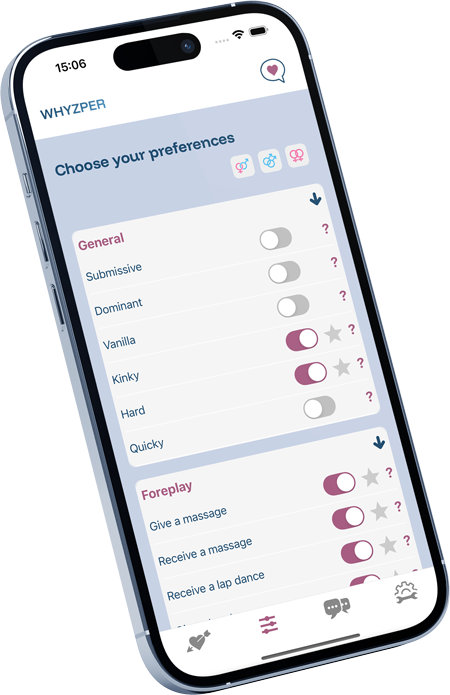Suddenly, there’s silence.
No arguments, no drama—but no affection either. The bedroom feels distant, and you start wondering: Did I do something wrong? Am I no longer attractive? Is it me—or is it us?
When one partner loses interest in sex, it often leads to uncertainty, frustration, or even shame. But sexual disinterest is rarely simple or one-sided. More often, there’s something deeper going on: stress, a lack of emotional connection, unspoken desires—or a mix of all these things.
The good news? You don’t have to just accept it.
There are ways to rekindle desire—without pressure, blame, or guilt.
In this article, you’ll discover five of the most common reasons behind low sexual desire—and what you can do to reconnect and feel closer again.
New to Whyzper? Discover how our app helps couples deepen their connection. Learn more about Whyzper!
Reason #1: Stress and Mental Overload
Stress-related sexual disinterest is one of the most common reasons things suddenly go quiet in the bedroom.
Because desire doesn’t start in the body—it starts in the mind. And for many, the mind is already overwhelmed: deadlines, family tension, a never-ending to-do list. There’s little space left for lightness, intimacy, or erotic thoughts.
Men, in particular, tend to shut down emotionally when they’re overwhelmed—something their partner might interpret as rejection.
Women, on the other hand, often need emotional closeness to feel physically open—if that connection is missing, desire fades. And just like that, a vicious cycle begins.
What you can do:
– Remind yourselves: You can’t force desire, but you can make room for it.
– Take the pressure off—no sex is better than sex that feels forced.
– Rebuild small moments of everyday closeness: cooking together, truly listening, being attentive.
– And yes—sometimes it helps to simply put both phones away and be present.
Desire needs space—and that space only exists when the mind isn’t constantly in fight-or-flight mode.
Reason #2: Lack of Emotional Connection
Desire doesn’t come out of nowhere—it grows from connection.
When the sense of “us” fades in daily life, many couples feel less connected in bed as well. Emotional closeness and sexual desire go hand in hand: when you don’t feel seen, heard, or appreciated, physical intimacy becomes rare.
Small hurts, unresolved tension, or long silences can build invisible walls between you—even when love is still present.
Often, sex isn’t the core issue—it’s what’s missing before it.
What you can do:
– Create space for genuine connection—outside of arguments and daily routines.
– Start small rituals for meaningful conversations: a weekly walk or distraction-free breakfast check-in.
– Try tools like FlowSync in Whyzper, which gently prompts regular check-ins about each other’s needs—without pressure, but with real connection.
– Don’t just talk about tasks—talk about you.
Because sometimes all it takes is a simple, honest: “How are you really doing?”

Ready to explore your desires together?
Whyzper lets you share your sexual desires playfully and without pressure – privately and only when both partners agree.
Download Whyzper for freeReason #3: Unspoken or Unfulfilled Desires
A lack of desire doesn’t always mean a lack of attraction—it often signals a lack of openness.
When desires go unspoken, things can start to feel routine or even frustrating. What was once exciting becomes predictable. And both partners sense that shift—even if no one says it out loud.
Unspoken sexual needs can feel like static in the background—you know something’s missing, but you can’t quite name it.
The challenge? Many people are afraid to talk about fantasies or preferences—for fear of rejection, embarrassment, or being misunderstood.
What you can do:
– Talk about your desires—playfully and without pressure.
– Use a tool like Whyzper’s desire matching feature: You both enter your interests separately—and only overlapping desires are revealed.
– That way, talking about sex isn’t a tightrope walk—it becomes a safe, curiosity-driven path to more closeness.
Because real intimacy begins where both partners feel free to say what they truly want.
Reason #4: Physical or Hormonal Causes
Not all loss of desire is emotional or relational. Libido is also influenced by biology—and it’s sensitive to a wide range of physical factors: hormonal fluctuations, medication (such as antidepressants or hormonal contraceptives), and chronic health conditions.
In fact, hormonal imbalances can quietly reduce sexual desire in all genders—often without an obvious reason. And when that happens, shame or insecurity can creep in, especially if someone feels like their body is “not normal.”
What you can do:
– Talk openly about physical changes—without blame or pressure.
– Take low desire seriously, but approach it with care: not everything is psychological. A medical check-up can help.
– Show understanding if your partner’s body isn’t in sync right now—and explore other ways to stay connected.
When hormonal causes are involved, the most important things are patience, empathy, and the knowledge that there’s often a way back to desire—even if it takes some time and understanding to get there.
Reason #5: When Sex Becomes a Duty Instead of a Desire
When sex stops being about genuine desire and starts to feel like an obligation, the spark begins to fade.
What might have once been a loving gesture turns into silent pressure—leading to rejection, emotional withdrawal, or growing distance.
Many people say yes when they actually mean no.
To avoid conflict.
To not disappoint their partner.
Because they believe “that’s just how relationships work.”
But that silent compromise chips away at trust, intimacy—and, over time, at sexual desire itself.
What you can do:
– Talk openly about pressure, expectations, and boundaries.
– Give yourselves permission to say no—without guilt.
– Explore new ways to connect without performance or pressure: touch, closeness, imagination—without rushing toward the goal of “sex.”
– Whyzper can support you in rediscovering desire through curiosity, not obligation.
Sexual disinterest in a relationship is often not about wanting less sex—but about needing more space. Space for honesty, connection, and freedom in how intimacy unfolds.
How to Rebuild Connection—Without Pressure
Desire rarely comes back through pressure—but it can return through connection.
Small steps make a big difference: gentle touches in daily life, shared laughter, honest conversations without blame.
Digital tools can help: With Whyzper’s FlowSync feature, you can quietly express desire—without having to talk about it. And with desire matching, you can explore new fantasies without fear of rejection.
Because desire doesn’t come from duty—but from closeness.
Take your time. Let go of the pressure. And rediscover what feels good for both of you.
Conclusion: Low Desire Doesn’t Mean Low Love
A lack of sexual desire doesn’t mean the love is gone.
It’s often a sign that something in the relationship needs attention.
With curiosity, care, and honest conversations, couples can create a new kind of closeness—one that makes room for desire to return.
Not sure where to begin?
Whyzper helps you reconnect—gently, playfully, and without pressure.





